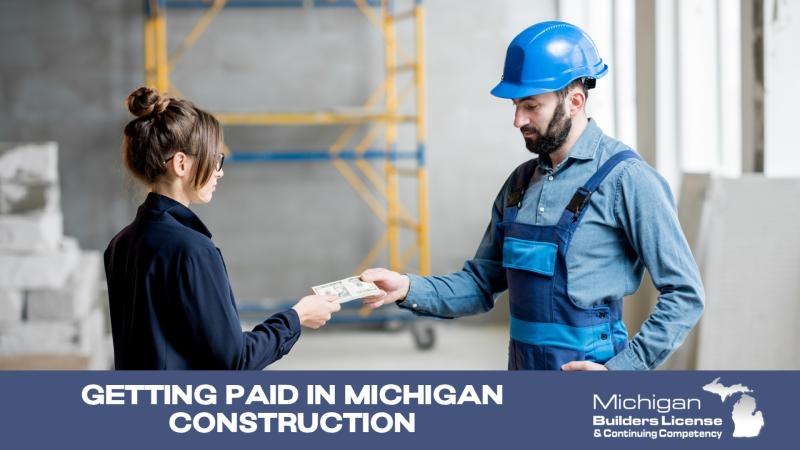If you're a licensed builder in Michigan—or planning to become one—there's a powerful state law you need to understand: the Michigan Builders' Trust Fund Act. This law directly impacts how and when subcontractors, laborers, and suppliers must be paid—and the penalties for not complying are severe.
Whether you're a general contractor managing multiple jobs or a subcontractor wondering if you'll ever see that final check, the Trust Fund Act offers critical protection. And now, this vital topic is fully covered by Sid Woryn in Michigan Builders License's updated 3-Hour Continuing Competency Course, available for 2026 license renewal.
What Is the Michigan Builders' Trust Fund Act?
The Trust Fund Act, also known as the Michigan Building Contract Fund Act (Public Act 497 of 1980), is designed to prevent fraud in the construction industry. It declares that any money paid to a contractor or subcontractor for a building project is automatically considered a trust fund. That means those funds must first be used to pay for all labor, materials, and subcontracted services associated with the job before the contractor can use the money for any other purpose.
Violating this law—especially with intent to defraud—is not just unethical; it's a felony. Convicted violators can face fines of up to $5,000 and up to three years in prison.
Real-Life Example from the Field
In the new Michigan Builders License Continuing Competency course, master instructor Sid Woryn brings the Trust Fund Act to life with a true story: a subcontractor owed $30,000 was told by the general contractor, "I haven't been paid yet." But with a little investigation, it turned out the homeowner had already paid the GC in full.
By proving this and referencing the Trust Fund Act, the subcontractor was able to recover payment—avoiding an unnecessary and illegal lien and bypassing years of court battles. As Sid says, it's not the dollar amount that gets contractors to take notice—it's the possibility of "meeting new friends in a state prison."
How to Protect Yourself Under the Act
Sid outlines key steps that all contractors—especially subcontractors and suppliers—should follow to ensure they're protected:
- Use a Notice of Furnishing within 20 days of starting work. This legally informs both the general contractor and homeowner that you're on the job and expect to be paid.
- Verify payment to the GC before filing a lien. Filing a false lien can lead to legal consequences for you.
- Document everything—especially when payment is delayed or disputed.
- Ask for a Notice of Commencement before work begins. This provides legal clarity on who owns the property and who the GC is.
- Use contracts with clear payment timelines, preferably including clauses for mediation or arbitration in case of disputes.
What About Prompt Payment Laws?
The Trust Fund Act works hand-in-hand with Michigan's prompt payment laws, which establish legal timelines for when payments must be made. For example:
- Residential construction contracts often require that subcontractors be paid within a specific number of days after the GC receives funds.
- Contractors who delay payments beyond agreed terms can face interest penalties—and legal action.
Even if a contract says payment will occur after the GC gets paid, the Trust Fund Act takes precedence. If the GC has been paid and hasn't paid you, they're likely violating the law.
Something Important To Consider
If you're renewing your builder license in 2026, understanding Michigan's business and construction laws isn't just helpful—it's mandatory. The updated 3-hour Continuing Competency Course from Michigan Builders License now includes this vital topic, with Sid Woryn walking you through the Trust Fund Act, prompt payment timelines, and real strategies to avoid disputes and stay legally protected.
You'll also learn about:
- Proper use of lien law
- Avoiding illegal liens
- Alternatives to small claims court
- Payment timelines and dispute resolution clauses
- Legal strategies subcontractors can use without hiring a lawyer
Be Informed. Stay Protected.
As a builder, it's your responsibility to know the law—and your right to be paid fairly. The Trust Fund Act puts legal power behind that promise, but only if you know how to use it.
Enroll today in the Michigan Builders License 3-Hour Continuing Competency Course and hear Sid Woryn break it all down in plain English. Whether you're protecting yourself from fraud or just trying to get paid on time, this course equips you with the knowledge and confidence to handle payment disputes the right way.
Click here to choose your Continuing Competency Course
Sources:
Michigan Builders' Trust Fund Act (Public Act 497 of 1980) - https://www.legislature.mi.gov/(S(pz1nz5uhzefozyfkjzdxt3xt))/mileg.aspx?page=getObject&objectName=mcl-Act-497-of-1980
Michigan Compiled Laws – Trust Fund Section (MCL 570.151 to 570.153)
Full Text:
· MCL 570.151 – Trust Fund Created
https://www.legislature.mi.gov/Laws/MCL?objectName=MCL-570-151
· MCL 570.152 – Penalties
https://www.legislature.mi.gov/Laws/MCL?objectName=MCL-570-152
· MCL 570.153 – Construction of Act
https://www.legislature.mi.gov/Laws/MCL?objectName=MCL-570-153
Michigan Prompt Payment Act (Public Act 232 of 1985)
https://www.legislature.mi.gov/Laws/MCL?objectName=MCL-ACT-232-OF-1985
Michigan Construction Lien Act (Public Act 497 of 1980, separate sections)
https://www.legislature.mi.gov/documents/mcl/pdf/mcl-act-497-of-1980.pdf


